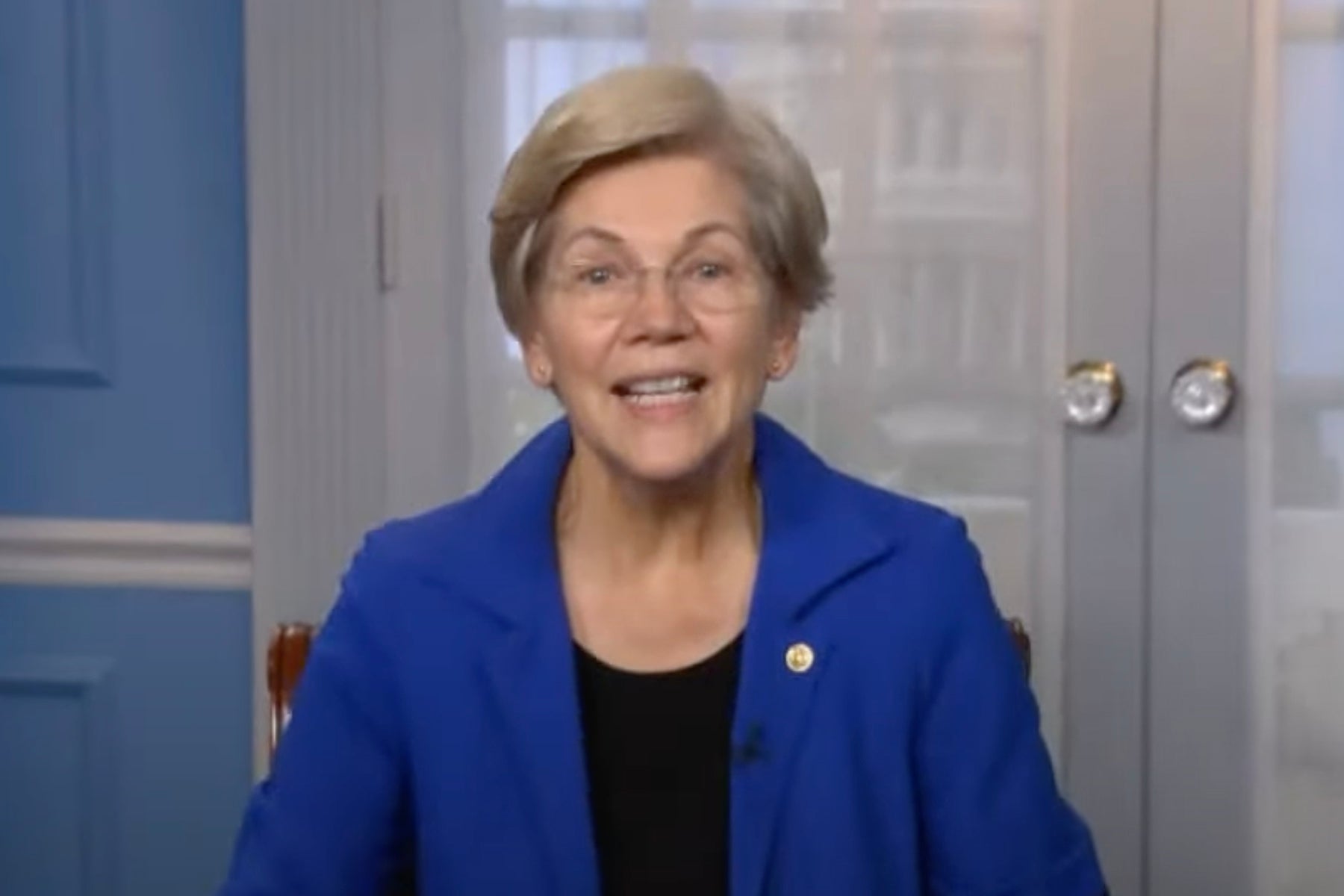At an event last week to celebrate the launch of the Center for Labor and a Just Economy at Harvard Law School, Sen. Elizabeth Warren outlined what she said are the many opportunities and challenges now facing the labor movement.
“From Starbucks to Amazon to university campuses, workers are voting to unionize and bargain for better pay, better benefits and better working conditions,” she said. “And here is the good news: Workers are winning. But that has not stopped companies from union-busting. And they’ve come up with new ways to do it, from surveilling workers’ private messages to denying union shops key benefits, like access to safe abortions or gender affirming care.”

Meanwhile, she said, millions of workers are “cut out of the deal altogether” by being classified as independent contractors. “These exploitative business models allow companies like Uber, Lyft and Amazon to extract every cent from these workers without any guarantee of a minimum wage, overtime pay, the right to organize or any of the other critical protections that traditional employees get.”
“From Starbucks to Amazon to university campuses, workers are voting to unionize and bargain for better pay, better benefits and better working conditions. And here is the good news: Workers are winning.”
Sen. Elizabeth Warren
The newly inaugurated Center for Labor and a Just Economy represents an evolution forward for the Labor and Worklife Program, which was originally founded in 2002. In that previous incarnation, the center racked up a host of accomplishments, including the 2018 launch of its “Clean Slate for Worker Power” program, an ambitious effort to fix a broken system of labor laws. The initiative is led by its executive director, Professor Sharon Block, and its faculty co-director, Benjamin Sachs, the Kestnbaum Professor of Labor and Industry.
As Sharon Block explained in an interview, “This moment for the center — with a new mission and an expanded vision — positions us to be the center of gravity for a comprehensive, long-term strategy to develop paradigm shifting policies. Our intent is that our innovative focus on changing the legal infrastructure for allocating power can provide the ‘source material’ for groups operating closer to the ground to make change.”
Faculty co-director Benjamin Sachs added, “The center will build on but also expand beyond the important work of the Labor and Worklife program by investigating how law can be shaped to enable lower- and middle-income people to build a more just economy and a more equitable political system.”

Sachs outlined some of the specific goals during the webinar. “We’ll be working on ideas for how states and localities can pass laws and enact programs that facilitate worker organizing, and give workers more say in the decisions that govern their lives — all while we continue to press for our Clean Slate recommendations for comprehensive labor law reform at the federal level. And we’ll be a resource for groups and policy makers that want to translate our ideas into action.”
“Our intent is that our innovative focus on changing the legal infrastructure for allocating power can provide the ‘source material’ for groups operating closer to the ground to make change.”
Sharon Block, CLJE executive director
During the launch event, Block framed this as a time of “head-spinning crosscurrents for the U.S. labor movement and attempts to build worker power.” For good news she cited a “remarkable wave” of recent organizing, including Starbucks baristas and Microsoft and Apple employees, and an upswing in strikes. But she also noted the lack of real progress at those companies, and the recent Supreme Court case of Glacier Northwest v. International Brotherhood of Teamsters, which she said, “could eviscerate the right to strike.” Invoking a famous Charles Dickens quote, she said this indeed the best and the worst of times.
Joelle Gamble, the U.S. Department of Labor’s chief economist under President Biden, looked at the economic forecast for the year to come. Speaking with Block via Zoom, she cited a few positive signs — including a rise in the number of people quitting their jobs, meaning that workers feel more secure in moving on, an increase in real wages, and a decline in the unemployment rate for workers of color.
“For decades we haven’t invested in workers,” she said. “This administration is trying to turn that around by doing a lot about workforce training, access to care, mental health and, frankly, investing in communities that have been blighted by globalization. All these things affect the labor supply. So, I think looking at the long-term LFPR [Labor Force Participation Rate] is an important way to hold ourselves accountable to some of these bigger structural changes that we want to make that will help people.”

The event closed with a panel discussion moderated by Politico columnist Eleanor Mueller, that included Sachs, National Education Association President Becky Pringle, and Jose Garcia, director of the Future of Workers team at the Ford Foundation. Mueller asked the panel what the way forward might be, with the Republicans controlling the House, the Democrats so far unable to pass the Protecting the Right to Organize Act, and President Biden’s State of the Union address a few weeks away.
“For decades we haven’t invested in workers … This administration is trying to turn that around by doing a lot about workforce training, access to care, mental health and, frankly, investing in communities that have been blighted by globalization.”
Joelle Gamble, chief economist, U.S. Department of Labor
Pringle saw this as a time for optimism, citing the Massachusetts “millionaire’s tax” as an example. “We have to believe in the plausibility of the possible,” she said. “I believe in workers’ ability to act across sectors and never stop lifting up their voice. Right there in Massachusetts, look what we did — fair taxes, we did that … I have that hope and that belief in our workers all over this country to help us not only create those opportunities for collective action, but to expand collective bargaining rights at every level in every state, red or blue.”
Garcia agreed that workers need to raise their voices, but echoed Warren’s point that enforcement is also a key part of the picture “The last step is NRLB [National Labor Relations Board] enforcement. And we hope that the Labor Standards Enforcement Agency will use their prosecutorial discretion with more frequency and regularity … and provide employment authorization so that workers can support themselves during dispute processes. This is something that is procedural, in the hands of these agencies. So, we hope that they also use their departmental power to ensure that workers are in the forefront of our economy.”
Want to stay up to date with Harvard Law Today? Sign up for our weekly newsletter.
